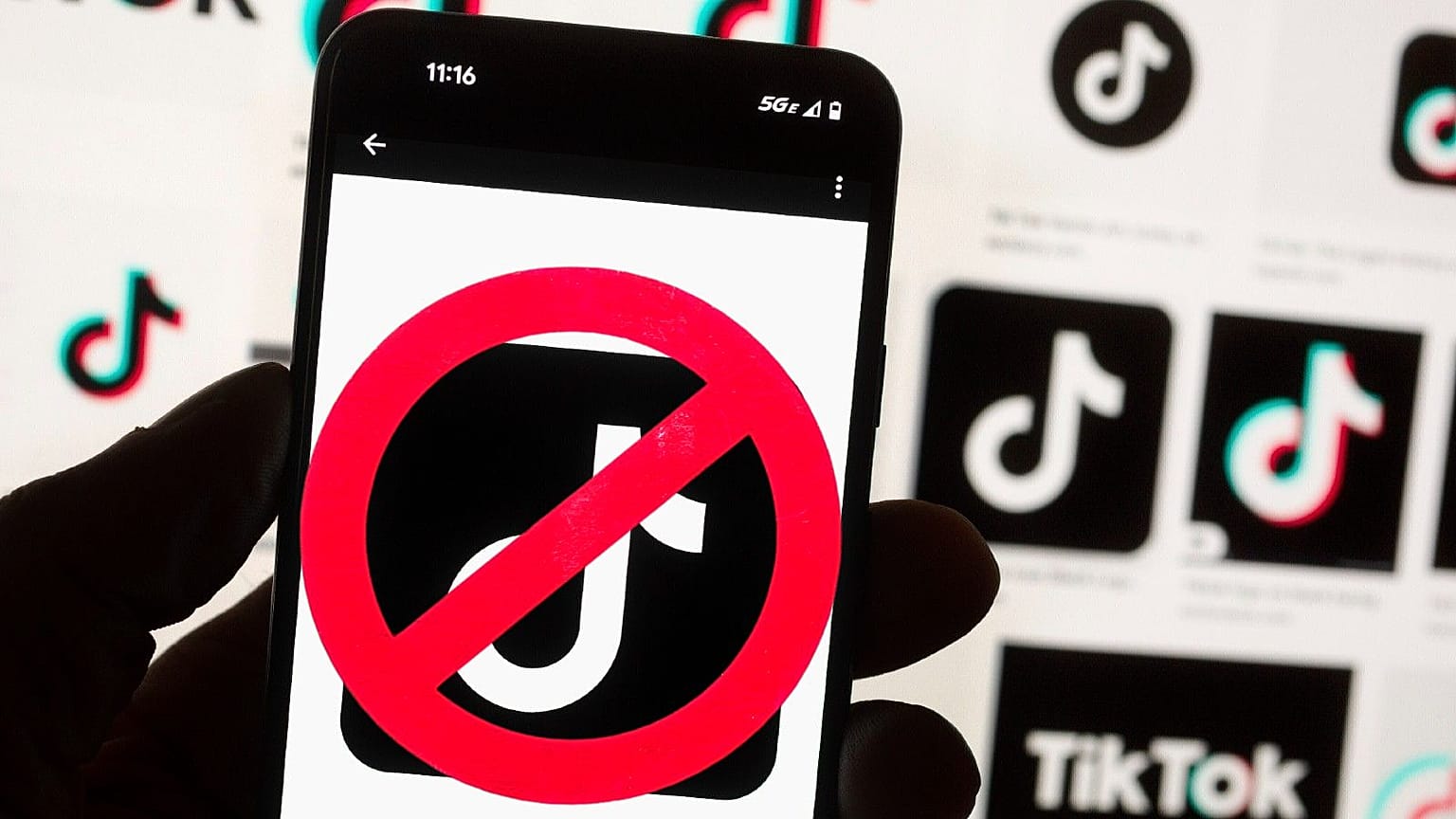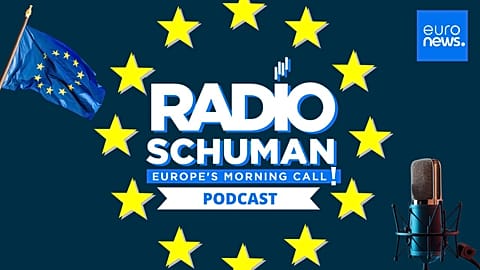While the United States will likely become the first country to ban TikTok outright, many others are concerned about the platform's ties to China.
The US Supreme Court upheld on Friday a law that will ban social media app TikTok over concerns about national security if it is not sold by its Chinese owners, ByteDance.
 ADVERTISEMENT
ADVERTISEMENT
 ADVERTISEMENT
ADVERTISEMENT
The law was passed by both sides of the American political divide in April last year but has been caught up in legal wrangling for the last 10 months.
It looks likely that the ban will now go into force on Sunday on President Joe Biden's last full day in office before Donald Trump takes over for his second term on Monday.
The US will become the first country to outright ban the platform but several countries took steps in quick succession to ban it on government devices in 2023, fearing that sensitive information could be exposed when the app is downloaded.
Why is TikTok under fire?
TikTok disputes accusations that it collects more user data than other social media companies and has called the bans "basic misinformation," saying these had been decided with "no deliberation or evidence".
TikTok is owned by the Chinese technology company Bytedance but it insists it is run independently and does not share data with the Chinese government.
However, many countries remain cautious about the platform and its ties to China.
Western technology companies, including Airbnb, Yahoo, and LinkedIn, have also left leaving China or have downsized operations there because of Beijing's strict privacy law, which specifies how companies can collect and store data.
Here are the countries and regions that have announced or have already implemented partial or total bans on the app.
Albania
While the US will become the first to ban the platform, Albania issued a year-long ban on TikTok at the end of 2024.
The shutdown is not based on security concerns or the company's links to Chinese authorities but more on domestic issues with violence.
In December, Albanian Prime Minister Edi Rama said the social media site would be blocked in early 2025, blaming the platform for rising incidents of violence and bullying among young people.
He told a town hall meeting that TikTok "would be fully closed for all. There will be no TikTok in the Republic of Albania". The move has angered users of the app in the country.
Australia
On April 4, 2023, Australia banned TikTok from all federal government-owned devices over security concerns.
A notice issued by the Attorney General’s Department said TikTok poses security and privacy risks due to the "extensive collection of user data and exposure to extrajudicial directions from a foreign government that conflicts with Australian law".
Attorney-General Mark Dreyfus said in a statement that based on intelligence and security agencies’ advice, the ban would come into effect "as soon as practicable".
Estonia
At the end of March, 2023, Estonia's outgoing minister of IT and foreign trade, Kristjan Järvan, told a local newspaper that TikTok would be banned from smartphones issued by the state to public officials.
However, speaking to Eesti Päevaleht, the minister added: "If a public official uses their private phone while at work, we really won't be looking into that".
The furore surrounding the Romanian presidential election last year and concerns that TikTok was manipulated to give an advantage to the relatively unknown far-right candidate Călin Georgescu had officials across the European Union worried but as of December, the Estonian government made clear there were no plans for a ban.
The UK
On March 16, 2023, Oliver Dowden, the UK Secretary of State in the Cabinet Office, announced in a statement to the UK's House of Commons an immediate ban of the app on government official devices.
"This is a precautionary move. We know that there is already limited use of TikTok across government, but it is also good cyber hygiene," the minister said in his address to MPs.
The ban is based on a report by the UK's National Cyber Security Centre, which found "there could be a risk around how sensitive government data is accessed and used by certain platforms".
Although the UK was one the first countries to ban the use of other Chinese-owned technology such as Huawei's, critics flagged the delay in banning TikTok compared to allies.
EU institutions
The European Parliament, the European Commission, and the EU Council, the three top EU bodies, have all banned TikTok on staff devices, citing cybersecurity concerns.
The European Parliament's ban took effect on March 20, 2023. It also "strongly recommended" that members of parliament and staff remove the app from their personal devices as well.
Alleged Russian interference in the first round of the 2024 Romanian presidential election has further muddied the waters over the future of the app, with the European Commission formally launching an investigation into the platform in December for potential breaches of the Digital Services Act (DSA).
France
On March 24, 2023, the French government banned the installation and use of "recreational" applications such as TikTok, Netflix, and Instagram on the work phones of 2.5 million civil servants.
The ban, which was notified through a "binding" instruction, immediately took effect and does not apply to the personal phones of state employees.
France is the first country to step up efforts to also ban other "recreational" applications, such as Netflix, on government devices.
"Recreational applications do not present sufficient levels of cybersecurity and data protection to be deployed on administration equipment. These applications may therefore constitute a risk to the data protection of these administrations and their public officials," the French government said in a statement at the time.
French Minister of Public Service Stanislas Guerini tweeted that the measure was intended to "ensure the cybersecurity" of the country's administrations and civil servants.
In May last year, the French government implemented a temporary ban on TikTok in New Caledonia, a French overseas territory in the Pacific, in a bid to quell violent riots there.
The Netherlands
The Dutch Interior Ministry discouraged the use of all apps from "countries with an aggressive cyber programme targeted at the Netherlands or Dutch interests" on phones distributed by the government in March 2023.
It did not identify TikTok by name, but the advice followed an assessment by the national intelligence agency AIVD that warned that apps from countries such as China, Russia, North Korea, and Iran carried "a heightened risk of espionage".
"The central government must be able to do its work securely, including via its mobile devices," Alexandra van Huffelen, the Dutch Minister for Digitalisation said on March 21, 2023.
Eventually, the government wants all civil servants' business phones to be configured so that only applications, software or features that have been previously authorised can be installed and used.
Norway
On March 23, 2023, the Norwegian parliament banned Tiktok from work devices, after the country’s Justice Ministry warned the app shouldn’t be installed on phones issued to government employees.
Justice Minister Emilie Enger Mehl said in a statement that "in their risk assessments ... the Norwegian intelligence services single out Russia and China as the main risk factors for Norway's security interests".
She added that "they also single out social media as a forum favoured by potentially dangerous actors and others who want to influence us with disinformation and fake news".
Civil servants were told they could still use TikTok if necessary on professional grounds, but only on devices that are not connected to the government's network, the ministry said.
Norway's capital Oslo and its second-largest city, Bergen, also urged municipal employees to remove TikTok from their work phones.
Belgium
On March 10, 2023, Belgium announced it was banning TikTok from devices owned or paid for by Belgium's federal government for at least six months, citing worries about cybersecurity, privacy, and misinformation.
Prime Minister Alexander de Croo said the ban was based on warnings from the state security service and its cybersecurity centre, which said the app could harvest user data and tweak algorithms to manipulate its news feed and content.
Responding to Belgium’s announcement, TikTok said at the time that it was "disappointed at this suspension, which is based on basic misinformation about our company," adding that they were "readily available to meet with officials to address any concerns and set the record straight on misconceptions".
Denmark
On March 6, 2023, Denmark’s Defense Ministry announced it would "ban the use of the app on official units" as a cybersecurity measure.
In a statement, the ministry said the Scandinavian country’s Centre for Cyber Security - which is part of Denmark’s foreign intelligence service - had assessed there was a risk of espionage.
The ministry said "there were weighty security considerations within the defence ministry combined with a very limited work-related need to use the app," and that employees "are required to uninstall TikTok on service phones and other official devices as soon as possible if they have previously installed it".
United States
On March 13 last year, the US House of Representatives overwhelmingly passed a bill requiring TikTok's Beijing-based parent company to divest from the platform or face a nationwide ban.
The effort which was previously opposed by the Senate over free speech concerns was approved on April 24 as part of a larger package.
Congress has sent the bill to President Joe Biden, who said he would sign it into law.
"Congress is acting to prevent foreign adversaries from conducting espionage, surveillance, maligned operations, harming vulnerable Americans, our servicemen and women, and our US government personnel," said Senate Commerce Committee Chairwoman Maria Cantwell.
The law eventually found itself before the justices of the US Supreme Court who unanimously upheld the ban on January 17 on national security grounds.
More than half of the 50 US states have already banned TikTok from government devices over data security concerns, with the US government giving agencies until the end of March to delete the app from federal devices and systems.
Both the FBI and the Federal Communications Commission have warned that ByteDance could share TikTok user data with China’s authoritarian government.
There is also concern about TikTok’s content and whether it harms teenagers’ mental health. Researchers from the nonprofit Center for Countering Digital Hate said in a report in December that eating disorder content on the platform had amassed 13.2 billion views.
Roughly two-thirds of US teens use TikTok, according to the Pew Research Center and the app boasts 170 million users across the country.
Canada
On November 6, the Canadian federal government ordered TikTok to stop its operations in the country due to foreign interference concerns.
Innovation Minister François-Philippe Champagne told state media the decision to close two TikTok offices in Toronto and Vancouver came from advice from Canada's security and intelligence experts.
Canadians can still access TikTok and create content there, but Champagne advised that people do so knowing that their user data could be gathered by the Chinese government.
In February, the government banned TikTok from all government-issued devices, saying the app presents an "unacceptable" risk to privacy and security.
Employees are also blocked from downloading the application in the future.
Outgoing prime minister Justin Trudeau said at the time that further action may or may not follow.
"I suspect that as government takes the significant step of telling all federal employees that they can no longer use TikTok on their work phones many Canadians from business to private individuals will reflect on the security of their own data and perhaps make choices," Trudeau said.
"I’m always a fan of giving Canadians the information for them to make the right decisions for them," he added.
New Zealand
New Zealand announced TikTok would be banned from the phones of government lawmakers at the end of March 2023.
Unlike in other countries such as the UK, the ban doesn't affect all government workers and only applies to about 500 people in the parliamentary complex.
Parliamentary Service Chief Executive Rafael Gonzalez-Montero said officials could make special arrangements if they needed TikTok to perform their democratic duties.
New Zealand prime minister Chris Hipkins said he didn't have TikTok on his phone and added, "I'm not that hip and trendy".
As the January 19 deadline approaches for the US ban, New Zealand's Minister of Internal Affairs Brooke van Velden emphasised that the country had no plans to ban the platform.
"While we keep a keen eye on developments in other jurisdictions, our government has no current plans to ban TikTok in New Zealand," he told local media.
India
In 2020, India imposed a ban on TikTok and dozens of other Chinese apps, including the messaging app WeChat, over privacy and security concerns.
The ban came shortly after a clash between Indian and Chinese troops at a disputed Himalayan border killed 20 Indian soldiers and injured dozens.
The companies were given a chance to respond to questions on privacy and security requirements but the ban was made permanent in January 2021.
Taiwan
In December 2022, Taiwan imposed a public sector ban on TikTok after the FBI warned that TikTok posed a national security risk.
Government devices, including mobile phones, tablets, and desktop computers, are not allowed to use Chinese-made software, including apps like TikTok, its Chinese equivalent Douyin, or Xiaohongshu, a Chinese lifestyle content app.
Xiaohongshu, also known as RedNote, has seen a major influx of users as TikTokers migrated away from the platform as the US ban loomed closer.
Pakistan
Pakistani authorities have temporarily banned TikTok at least four times since October 2020, citing concerns that the app promotes immoral content.
Afghanistan
Afghanistan's Taliban leadership banned TikTok and the game PUBG in 2022 on the grounds of protecting youths from "being misled".

















